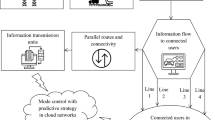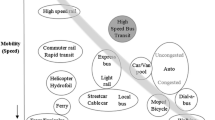Abstract
In this era characterized by fast development of urbanization, public transportation problem is one of the main obstacles for people to promote their life satisfaction in China. This paper aims at discussing problems on mass customization public transportation, providing suggestions and consults for its sustainable development and improvement. A mass customization model for public transportation is constructed based on client requirement and cost analysis, and case studies are made to validate route planning results. Results show that mass customization public transportation can make high profit for bus companies and relieve traffic congestion and air contamination.



Similar content being viewed by others
Explore related subjects
Discover the latest articles, news and stories from top researchers in related subjects.References
Armentano MG, Amandi AA (2011) Personalized detection of user intentions. Knowl-Based Syst 24(8):1169–1180
Biel A, Johansson-Stenman O, Nilsson A (2011) The willingness to pay–willingness to accept gap revisited: the role of emotions and moral satisfaction. J Econ Psychol 32(6):908–917
Bonev M, Hvam L, Clarkson J, Maier A (2015) Formal computer-aided product family architecture design for mass customization. Comput Ind 74:58–70
BPTC (Beijing Public Transport Corporation) (2020) Custom bus in Beijing. http://dingzhi.bjbus.com Accessed 28 October 2020
China Transinfo (2020) Custom bus are supposed to share the congestion pressure. http://www.ctfo.com Accessed 28 October 2020
Daaboul J, DaCunha C, Bernard A, Laroche F (2011) Design for mass customization: product variety VS process variety. CIRP Ann Manuf Technol 60(1):169–174
Darmoul S, Elkosantini S (2014) Artificial immunity to control disturbances in public transportation systems: concepts, mechanisms and a prototype implementation of a knowledge based decision support system. Knowl-Based Syst 68:58–76
Deng Y, Ru X, Ma R, Zhang HM (2016) Design of routing emergency shuttle bus for small-size metro railway network. Transportation Research Board 95th Annual Meeting. https://trid.trb.org/view/1392796 Accessed 28 October 2020
Drevs F, Tscheulin DK, Lindenmeier J, Renner S (2014) Crowding-in or crowding out: an empirical analysis on the effect of subsidies on individual willingness-to-pay for public transportation. Transport Res Part A Policy Pract 59(1):250–261
Duray R, Ward PT, Milligan GW, Berry WL (2000) Approaches to mass customization: configurations and empirical validation. J Oper Manag 18(6):605–626
Farahani RZ, Miandoabchi E, Szeto WY, Rashidi H (2013) A review of urban transportation network design problems. Eur J Oper Res 229(2):281–302
Fogliatto FS, da Silveira GJC, Borenstein D (2012) The mass customization decade: an updated review of the literature. Int J Prod Econ 138(1):14–25
Henderson V (2003) The urbanization process and economic growth: the so-what question. J Econ Growth 8(1):47–71
Hu SJ (2013) Evolving paradigms of manufacturing: From mass production to mass customization and personalization. Proc CIRP 7(12):3–8
Jou RC, Chen TY (2014) Factors affecting public transportation, car, and motorcycle usage. Transport Res Part A Policy Pract 61:186–198
Li L, Liu F, Li CB (2014) Customer satisfaction evaluation method for customized product development using entropy weight and analytic hierarchy process. Comput Ind Eng 77:80–87
Litman T (2017) Evaluating public transit benefits and costs: best practices guidebook. http://www.vtpi.org/tranben.pdf. Accessed 28 October 2020
Liu YX, Hong ZS, Liu Y (2016) Do driving restriction policies effectively motivate commuters to use public transportation? Energy Policy 90:253–261
Liu G, Yin Z, Jia Y, Xie Y (2017) Passenger flow estimation based on convolutional neural network in public transportation system. Knowl-Based Syst 123:102–115
Lu H, Li Y, Chen M, Kim H, Serikawa S (2018a) Brain intelligence: go beyond artificial intelligence. Mobile Netw Appl 23:368–375
Lu H, Li Y, Mu S, Wang D, Kim H, Serikawa S (2018b) Motor anomaly detection for unmanned aerial vehicles using reinforcement learning. IEEE Internet Things J 5(4):2315–2322
Lu H, Wang D, Li Y, Li J, Li X, Kim H, Serikawa S, Humar I (2019) CONet: a cognitive ocean network. IEEE Wirel Commun 26(3):90–96
Pei M, Lin P, Du J, Li X (2019) Operational design for a real-time flexible transit system considering passenger demand and willingness to pay. IEEE Access 7:180305–180315
Schniederjans DG, Christopher M, Starkey CM (2014) Intention and willingness to pay for green freight transportation: an empirical examination. Transport Res Part D Transport Environ 31:116–125
Schwarzlose AAI, Mjelde JW, Dudensing RM, Jin Y, Cherrington LK, Chen J (2014) Willingness to pay for public transportation options for improving the quality of life of the rural elderly. Transport Res Part A Policy Pract 61:1–14
Sharaby N, Shiftan Y (2012) The impact of fare integration on travel behavior and transit ridership. Transp Policy 21:63–70
Wan Z, Wang XF, Sperling D (2013) Policy and politics behind the public transportation systems of China’s medium-sized cities: Evidence from the Huizhou reform. Utilities Policy 27:1–8
Wang ZQ, Chen LF, Zhao XD, Zhou WH (2014) Modularity in building mass customization capability: the mediating effects of customization knowledge utilization and business process improvement. Technovation 34(11):678–687
Wang ZJ, Chen F, Fujiyama T (2015) Carbon emission from urban passenger transportation in Beijing. Transport Res Part D Transport Environ 41:217–227
Wei JC, Xia W, Guo XM, Marinova D (2013) Urban transportation in Chinese cities: An efficiency assessment. Transport Res Part D Transport Environ 23:20–24
Xu Y, Xu J, Bernard A (2013) Knowledge management in E-commerce mass customization: Product lifecycle management for society. In Proceedings of the 10th International Conference of Product Lifecycle Management, pp. 259–267
Author information
Authors and Affiliations
Corresponding author
Additional information
Publisher's Note
Springer Nature remains neutral with regard to jurisdictional claims in published maps and institutional affiliations.
Rights and permissions
About this article
Cite this article
Xu, Y., Wang, B., Liu, S. et al. Intelligent transportation systems design based on mass customization. J Ambient Intell Human Comput 13, 5189–5198 (2022). https://doi.org/10.1007/s12652-020-02677-6
Received:
Accepted:
Published:
Issue Date:
DOI: https://doi.org/10.1007/s12652-020-02677-6




